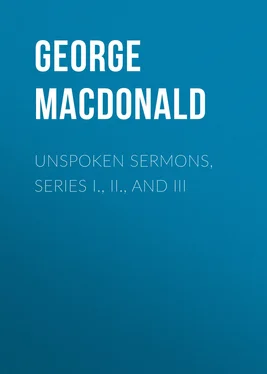"Are our enemies men like ourselves?" let me begin by asking. "Yes." "Upon what ground? The ground of their enmity? The ground of the wrong they do us?" "No." "In virtue of cruelty, heartlessness, injustice, disrespect, misrepresentation?" "Certainly not. Humanum est errare is a truism; but it possesses, like most truisms, a latent germ of worthy truth. The very word errare is a sign that there is a way so truly the human that, for a man to leave it, is to wander . If it be human to wander, yet the wandering is not humanity. The very words humane and humanity denote some shadow of that loving-kindness which, when perfected after the divine fashion, shall include even our enemies. We do not call the offering of human sacrifices, the torturing of captives, cannibalism—humanity. Not because they do such deeds are they men. Their humanity must be deeper than those. It is in virtue of the divine essence which is in them, that pure essential humanity, that we call our enemies men and women. It is this humanity that we are to love—a something, I say, deeper altogether than and independent of the region of hate. It is the humanity that originates the claim of neighbourhead; the neighbourhood only determines the occasion of its exercise." "Is this humanity in every one of our enemies?" "Else there were nothing to love." "Is it there in very deed?—Then we must love it, come between us and it what may."
But how can we love a man or a woman who is cruel and unjust to us?– who sears with contempt, or cuts off with wrong every tendril we would put forth to embrace?—who is mean, unlovely, carping, uncertain, self-righteous, self-seeking, and self-admiring?—who can even sneer, the most inhuman of human faults, far worse in its essence than mere murder?
These things cannot be loved. The best man hates them most; the worst man cannot love them. But are these the man? Does a woman bear that form in virtue of these? Lies there not within the man and the woman a divine element of brotherhood, of sisterhood, a something lovely and lovable,—slowly fading, it may be,—dying away under the fierce heat of vile passions, or the yet more fearful cold of sepulchral selfishness—but there? Shall that divine something, which, once awakened to be its own holy self in the man, will loathe these unlovely things tenfold more than we loathe them now—shall this divine thing have no recognition from us? It is the very presence of this fading humanity that makes it possible for us to hate. If it were an animal only, and not a man or a woman that did us hurt, we should not hate: we should only kill. We hate the man just because we are prevented from loving him. We push over the verge of the creation— we damn
Конец ознакомительного фрагмента.
Текст предоставлен ООО «ЛитРес».
Прочитайте эту книгу целиком, купив полную легальную версию на ЛитРес.
Безопасно оплатить книгу можно банковской картой Visa, MasterCard, Maestro, со счета мобильного телефона, с платежного терминала, в салоне МТС или Связной, через PayPal, WebMoney, Яндекс.Деньги, QIWI Кошелек, бонусными картами или другим удобным Вам способом.












